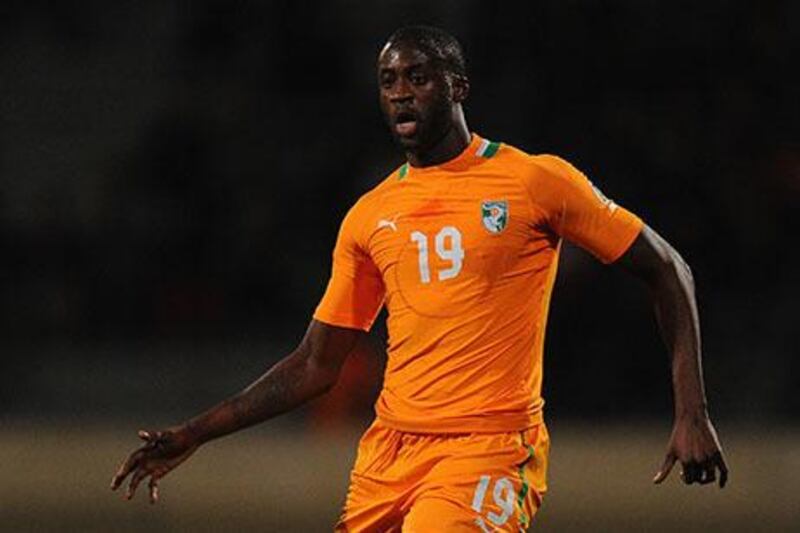Eleven days before they kicked off their third successive Fifa World Cup tournament, the players from the Ivory Coast squad gathered for a special event. Didier Drogba was handed a specially designed shirt to mark the landmark 100th cap he won for his country earlier this year.
The roles of Masters of Ceremony were taken by Didier Zokora and Kolo Toure, both centurions already and probably the most experienced central defensive partnership – they have nearly 230 caps between them – that will participate in the tournament.
For more World Cup stories, visit our World Cup 2014 page here.
Sceptics can become a little too hung up on the advanced age of some of the senior “Elephants”. It is easy to suggest that they are too far past their peak to make the sort of impact on a major tournament that this generation of Ivorians have long had the potential to do.
From within the camp, though, they prefer to stress the benefits of continuity and, while acknowledging Brazil 2014 will be the swansong for many totemic figureheads, point out that relationships that go back almost 20 years create strong bonds.
Zokora and Toure, both 33, have been playing in the same teams since childhood when they enrolled at the ASEC Abidjan academy, the nursery of so many of the players who form Ivory Coast’s so-called “golden generation”.
They and fellow ASEC graduates Yaya Toure, Salomon Kalou and Gervinho are curators of a special era, when Abidjan had a talent hothouse as productive as Barcelona’s fabled La Masia.
“Now people have opened academies all around Africa and things are not quite the same,” said Yaya Toure, whose journey started at ASEC and moved on through Belgium, Ukraine, Greece, France, Spain and the English Premier League, “and Ivory Coast football domestically has gone down a bit. But I hope it will come back.”
He said he hopes, too, that the core of old ASEC friends, plus later allies, such as Drogba, 36, who grew up mainly in France, can at last give Ivorians something substantial by which to remember the greatest concentration of talent the country has produced.
“We have an amazing squad of players and we all think it is about time we reach our full potential,” said the younger Toure, Africa’s Footballer of the Year for three years running and a key driver of Manchester City’s 2014 Premier League triumph.
“In the last two World Cups and in the African Cup of Nations, we have been disappointing. We haven’t gone as far as we should have.”
He struggles to pinpoint why two World Cup campaigns have halted at the group phase, a pair of African Cup of Nations have been lost on penalties in the final, and two others ended at the quarter-finals despite them being favourites.
“That’s the question everyone in the Ivory Coast wants an answer to. Sometimes you need something a little bit more than 11 very good players if you want to win the biggest trophies.
“You have to have character or luck or something a little bit different,” Toure said. In 2006 in Germany, and four years later in South Africa, Ivory Coast were in tough groups.
Finding a way past Japan, Colombia and Greece this time may be less taxing. For all the concerns about age, Toure can list several key players who have just finished their club seasons in strong, even rejuvenated, form.
His own goalscoring has become a Premier League phenomenon: he hit 20 from midfield for City in the league. Kalou has been scoring regularly at Lille and Gervinho has been sparking for Roma.
“You know, when you see the generation of players we have, it is absolutely fantastic. You don’t see players like the ones we have playing for one team very often. We have top players who are all at top clubs in Europe,” Toure said.
“When I look around and see Drogba, Kalou, Gervinho, Zokora and Wilfried Bony, I can only be filled with confidence. Why we haven’t gone on to win a trophy is something I really can’t understand. We want and we hope we make it up this time, because some of us haven’t got a lot of time left.”
There are promises to honour, to an Ivorian population who have suffered several phases of political unrest and conflict in the years their best footballers have become global icons.
“Football has played a big part in the lives of the people,” Toure said.
“We say to them ‘enjoy the way we play football, don’t think about war’. The aim has always been to make the people of the Ivory Coast happy.
“When conditions were bad, life was tough, we just wanted to give our people some happiness by playing football. Because you know how important it is, you are desperate to do well.”
sports@thenational.ae
Follow our sports coverage on Twitter @SprtNationalUAE






